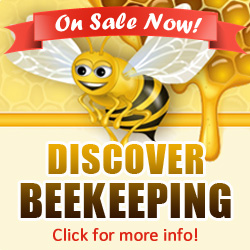Believe it or not, honey bee pollen is good for more than causing allergies! It has been shown that 35 grams of honey bee pollen a day contains all the known nutrients to sustain human life, and fresh honey bee pollen is more nutritionally valuable than honey! honey bee pollen is also a necessary ingredient for a honeybee’s diet. Without the correct amount of honey bee pollen in a hive the colony will die. So when the time comes for sniffing, sneezing, and watery eyes don’t wish away the honey bee pollen; try some instead!
A colony’s existence depends almost entirely on honey bee pollen. It is used in the hive by worker bees to produce royal jelly which is fed to the brood until they are 3 days old. Then they are fed diluted honey and honey bee pollen (beebread), unless the larvae is a baby queen. She is spoiled with – I mean – fed royal jelly her entire life. The honey bee pollen that the rest of the hive uses is collected by foragers and packed into certain cells in the food chamber (which is a place near the brood chosen for food storage). Then the honey bee pollen is mixed with a little bit of honey and enzymes that are designed to prevent sprouting, and covered with a thin layer of honey. This is the bee’s version of bread, also known as Beebread! The larva depend on the worker bees to feed this to them, so without honey bee pollen to make the beebread and royal jelly a colony’s population would quickly dwindle away.
Humans have been using honey bee pollen for centuries as a dietary supplement since it boosts energy levels and contributes to your overall health so well. Bee honey bee pollen contains 22 amino acids, Vitamin C , B-complex, folic acid, polyunsaturated fatty acids, enzymes, and carotene – all of the major antioxidants that have been discovered so far. A number of vital trace elements that benefit your body, that it can’t manufacture itself and needs in order to stay healthy, have been found in honey bee pollen. Those trace elements include iron, zinc, manganese, copper, calcium, magnesium, and potassium – all minerals that have proven health benefits. The American Apicultural Society wrote concerning honey bee pollen that:
“There is a rapidly increasing body of scientific evidence which shows that honey bee pollen has a variety of anti-inflammatory, anti-cancer, and anti-arthritic properties. It’s anti-inflammatory and anti-allergic properties, as well as it’s immune system normalizing phytochemicals, allow bee honey bee pollen to be used therapeutically to decrease symptoms in people who have hay fever and honey bee pollen sensitivities…. honey bee pollen has been reported to be useful in many other medical conditions including: varicose veins, high cholesterol and triglycerides, fatigue, infertility, impotence, anorexia, obesity, constipation, diarrhea, hypertension, prostatitis, depression, scar formation, and recovery from illness and surgery. honey bee pollen is compatible with other therapies, it can be used long term, has no toxicity even at high doses for those who are not sensitive or allergic, and is safe to take as a supplement during pregnancy.”
Honey bee pollen is extremely beneficial, as you can see, and tends to stand in the shadow of “honey~the liquid gold”, so why not try a little this year and be one more person to spread the good news about this mistaken treasure.






Speak Your Mind